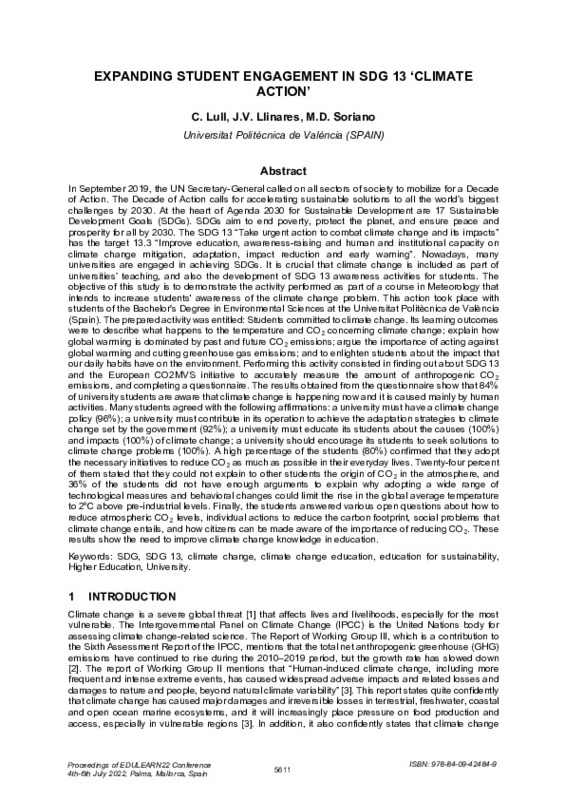|
Resumen:
|
[EN] In September 2019, the UN Secretary-General called on all sectors of society to mobilize for a Decade
of Action. The Decade of Action calls for accelerating sustainable solutions to all the world¿s biggest
challenges ...[+]
[EN] In September 2019, the UN Secretary-General called on all sectors of society to mobilize for a Decade
of Action. The Decade of Action calls for accelerating sustainable solutions to all the world¿s biggest
challenges by 2030. At the heart of Agenda 2030 for Sustainable Development are 17 Sustainable
Development Goals (SDGs). SDGs aim to end poverty, protect the planet, and ensure peace and
prosperity for all by 2030. The SDG 13 ¿Take urgent action to combat climate change and its impacts¿
has the target 13.3 ¿Improve education, awareness-raising and human and institutional capacity on
climate change mitigation, adaptation, impact reduction and early warning¿. Nowadays, many
universities are engaged in achieving SDGs. It is crucial that climate change is included as part of
universities¿ teaching, and also the development of SDG 13 awareness activities for students. The
objective of this study is to demonstrate the activity performed as part of a course in Meteorology that
intends to increase students' awareness of the climate change problem. This action took place with
students of the Bachelor¿s Degree in Environmental Sciences at the Universitat Politècnica de València
(Spain). The prepared activity was entitled: Students committed to climate change. Its learning outcomes
were to describe what happens to the temperature and CO¿ concerning climate change; explain how
global warming is dominated by past and future CO¿ emissions; argue the importance of acting against
global warming and cutting greenhouse gas emissions; and to enlighten students about the impact that
our daily habits have on the environment. Performing this activity consisted in finding out about SDG 13
and the European CO2MVS initiative to accurately measure the amount of anthropogenic CO¿
emissions, and completing a questionnaire. The results obtained from the questionnaire show that 84%
of university students are aware that climate change is happening now and it is caused mainly by human
activities. Many students agreed with the following affirmations: a university must have a climate change
policy (96%); a university must contribute in its operation to achieve the adaptation strategies to climate
change set by the government (92%); a university must educate its students about the causes (100%)
and impacts (100%) of climate change; a university should encourage its students to seek solutions to
climate change problems (100%). A high percentage of the students (80%) confirmed that they adopt
the necessary initiatives to reduce CO¿ as much as possible in their everyday lives. Twenty-four percent
of them stated that they could not explain to other students the origin of CO¿ in the atmosphere, and
36% of the students did not have enough arguments to explain why adopting a wide range of
technological measures and behavioral changes could limit the rise in the global average temperature
to 2°C above pre-industrial levels. Finally, the students answered various open questions about how to
reduce atmospheric CO¿ levels, individual actions to reduce the carbon footprint, social problems that
climate change entails, and how citizens can be made aware of the importance of reducing CO¿. These
results show the need to improve climate change knowledge in education.
[-]
|
|
Agradecimientos:
|
This work has been sponsored by the Vice-Rectorate for Organization of Studies, Quality and
Accreditation of the Universitat Poltècnica de València (Valencia, Spain) as part of the UPV¿s
Educational Innovation and Improvement ...[+]
This work has been sponsored by the Vice-Rectorate for Organization of Studies, Quality and
Accreditation of the Universitat Poltècnica de València (Valencia, Spain) as part of the UPV¿s
Educational Innovation and Improvement Projects (Reference PIME 20-21/224) entitled Moving
towards Sustainable Development Goals at the UPV: the poliODS Project.
[-]
|









